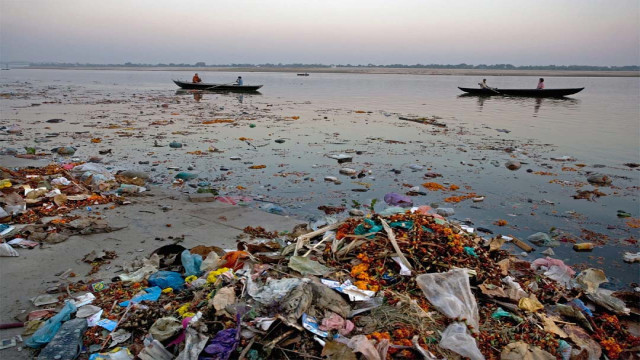Dhaka, Feb 19 (V7N)— Uncontrolled dumping of solid and liquid waste into the Padma River is causing severe water pollution and accelerating river erosion, experts have warned.
Speaking to BSS on Tuesday, Professor Mijanur Rahman from the Department of Geography and Environmental Sciences at Rajshahi University (RU) highlighted the alarming rate at which waste is being dumped into the river and along the city’s protective embankment.
He pointed out that the Padma River in Rajshahi is suffering from both illegal encroachment and pollution, with construction debris, broken tiles, and concrete waste being discarded along its banks. Additionally, fish diversity has declined due to factors such as unregulated fishing, the use of illegal fishing gear, contamination from agrochemicals, and plastic pollution.
"A few years ago, I studied the liquid waste flowing through the sluice gate of the Water Development Board into the Padma River and found significant pollution levels, which have only worsened over time," he said.
He further cautioned that declining fish populations and the presence of metal traces in the river's water pose health risks, particularly when the water is used for agriculture. He also stressed the necessity of effluent treatment plants in institutions and factories, which are currently lacking in Rajshahi.
Another major concern is the indiscriminate disposal of battery acid from the 20,000–25,000 registered and unregistered easy bikes operating in the city. The acid, dumped into sewage drains, eventually reaches the Padma, causing severe harm to aquatic life.
Arifur Rahman Ankur, executive engineer of the Rajshahi Water Development Board, noted that liquid waste from the city flows into the river through five sluice gates. However, these gates are closed during the monsoon to prevent water from entering the city.
Household waste is also being dumped into the river, particularly in areas such as Bulanpur, Keshabpur, Srirampur, Kumarpara, Sekher Chowk, Panchabati, Talaimari, and Shampur. Restaurants in different parts of the city, including Pathanpara, Dargarapara, Barakuthi, and Srirampur, have also been found disposing of plastic, polythene, and other waste directly into the river.
Local residents have acknowledged the issue, with Runa Akhter, a 54-year-old resident of Kumarpara, stating that dumping waste into the river is a common practice in her neighborhood. Additionally, garbage is being discarded along the T-dam near Keshabpur Police Line, where plastic cups, bottles, and polythene are scattered along the embankment.
Golam Rasul, who has run a pan-bidi shop on the dam for 15 years, confirmed that waste dumping into the Padma River has been happening for a long time.
Experts have raised concerns that liquid waste entering the river, particularly through the sluice gates in Dargapara, contains harmful elements that further deteriorate water quality and endanger aquatic biodiversity.
Professor Chowdhury Sarwar Jahan from RU’s Department of Geology and Mining noted that pollution has already devastated the aquatic biodiversity of the Baranai River, which flows near the city. He emphasized that both solid and liquid waste disposal into the river is prohibited by law, as liquid waste depletes biological oxygen levels, threatening aquatic life.
Mizanur Rahman, chairman of Save the Nature and Live, warned that plastic waste and polythene bags are among the most hazardous pollutants affecting the Padma River. Despite campaigns to reduce polythene use, progress has been minimal.
"If river pollution and encroachment are not tackled immediately, the consequences will be devastating for the livelihoods of people in the Barind Tract," he cautioned.
END/MSS/AJ































Comment: